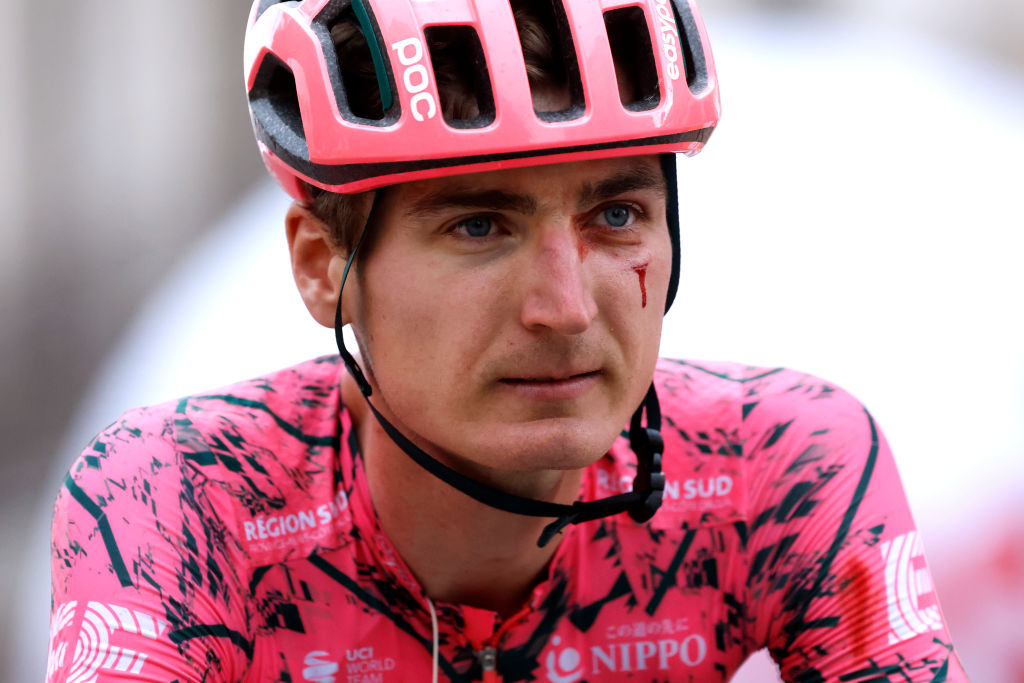Mark Padun: Tour de Pologne passing so close to Ukraine is an amazing gesture
EF Education-EasyPost rider the only Ukrainian in this year's race

This year's Tour de Pologne route book came with an unexpected gift for riders and race followers: a yellow and blue wristband, the colours of the Ukraine flag, to be worn as a gesture of solidarity and support for Poland's neighbour in its arduous battle against the Russian invasion.
Many members of the organisation and peloton are now wearing the wristbands during the seven-day race, but the Tour de Pologne's show of support for Ukraine runs far deeper.
Five of the seven stages, from Saturday to Wednesday, have been deliberately designed to run close to Ukraine through the east and south of the country. Monday's finish at Pzemysil is 15 kilometres from the Ukrainian border.
While some in cycling's establishment continue to insist that sport and politics should not mix, the Tour de Pologne's clear solidarity with Ukraine can count on some very powerful allies.
Mark Padun of EF Education-EasyPost is the only Ukrainian rider in the Tour de Pologne peloton this year and he is hugely appreciative of all the support for his country.
"The motto of this year's race is 'Race for Peace,'" the President of Poland, Andrzej Duda, an honorary patron of the Tour de Pologne, wrote in the preface of the 20022 route book.
"Russia's brutal invasion of sovereign and independent Ukraine continues right behind our eastern border. Russian troops are committing war crimes that bear the hallmarks of genocide. People are dying in the shelled and bombed cities, children are dying and athletes are dying too."
Get The Leadout Newsletter
The latest race content, interviews, features, reviews and expert buying guides, direct to your inbox!
Duda thanked the organisers for Pologne's support not only "for the idea of peace," but also "to demonstrate your solidarity with the Ukrainians fighting for their freedom."
"In the first weeks of the war, most refugees made their way precisely to such cities and towns as Lublin, Chelm, Zamosc, Krasnik, Przemysil, Lesko, Sanok, Lancut and Rzeszow," he explained, the start of finish town of the opening five stages.
"May the race between these cities be a great gesture of remembrance of the cities destroyed in Ukraine by the barbaric Russian invaders."
Padun is hugely appreciative of all the support for his country.
"I saw all these bracelets with the Ukrainian flag in the route book and when I checked the southern part of the route and saw stages go really close to the border, I was like, wow, that's something amazing," he told Cyclingnews and another reporter present at the race.
Padun doesn't just appreciate the geographical connections, he has direct personal links to them.
"The finish city of Zamosc for stage 2, for example - I did a race there, and I lived there for a week while it was taking place, so I also know this area very well," he explains.
"So apart from the support and the gestures, it's also nice to have these nostalgic memories from when I was young."
Padun said he had not requested to race Tour de Pologne this year, nor had his team ordered him to do so. Simply, coming from a neighbouring country, he likes racing in Poland whenever he can.
"Nothing has changed since then. It's also exciting because Poland was the first country I visited after Ukraine, and I have only good memories from here."
Padun divides his time between Andorra and Italy but he is constantly in touch with his relatives back in Ukraine.
"Luckily all my family are safe, all my friends and this is the most important thing for me now," he said.
Padun admits he feels an emotional link with the race this year.
"I want to be here," he repeated - his reason for taking part was that of any athlete: a desire to win.
"I haven't raced for more than a month, so I don't know exactly how my body will respond. But I'm still confident and I'm still looking for some really good results here," he said.
Alasdair Fotheringham has been reporting on cycling since 1991. He has covered every Tour de France since 1992 bar one, as well as numerous other bike races of all shapes and sizes, ranging from the Olympic Games in 2008 to the now sadly defunct Subida a Urkiola hill climb in Spain. As well as working for Cyclingnews, he has also written for The Independent, The Guardian, ProCycling, The Express and Reuters.
